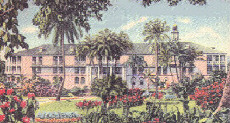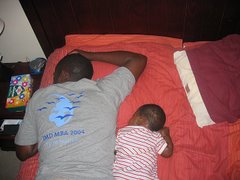
Two brothers having fun with their PlayStation at home in Connecticut.
They are singing and strumming along to songs on the video game Guitar Hero 2, with the plastic guitar controller pressed to their stomachs.
Then, lightning, followed by a severe thunderclap and they both drop to the floor - not part of their performance, it's the impact from the lightning strike.
---------------------------------------------
See below for more on this story (Source: Today's Wall Street Journal)
Chris Bergin and his brother, Ben, were jamming along to "Message in a Bottle" on the videogame Guitar Hero 2 during a storm in June when a bright light flashed and a thunderclap shook their house in Wilton, Conn.
The lightning strike nearby triggered a power surge that snaked through the house's electrical system to Mr. Bergin's PlayStation 2 then traveled through the wiring to the plastic guitar controller pressed up against his stomach.
"I just remember falling to the ground and looking at my brother 'cause he was on the ground, too," says the 15-year-old Mr. Bergin. The two brothers weren't hurt, but their PlayStation was fried, along with their laptop computer, television set, cable and phone wiring and ceiling fan.
Lightning safety experts, endorsing common sense, have long advised that indoors is the safest place to be during an electrical storm. The National Weather Service recently adopted the slogan, "When thunder roars, go indoors."
But the spread of high-tech devices, including laptops and videogames, means there are new ways in which people can suffer injuries or property losses, even in the relative safety of their homes. A division ofSony Corp., Sony Computer Entertainment America, the maker of PlayStation products, says it hadn't heard of incidents like this and says its devices come with safety instructions about lightning. Activision Inc., which makes the Guitar Hero game, advocates staying off electronics during storms.
Mark Earley, chief electrical engineer at the National Fire Protection Association, says the new lightning safety slogan should be modified slightly: "When thunder roars, stay indoors -- and read a book."
Among the recent incidents: A Mississippi teenager got zapped while holding a computer mouse; a Washington, D.C., man received mild burns from a laptop resting on his legs; and a Georgia police communications manager felt a stinging sensation when lightning jolted the police department -- "like somebody took their middle finger and flicked me in the cheek," she says.
"My hair was tingling. My teeth hurt," says Stacy Blackwell, of the Winder, Ga., police. The strike in July "blew up quite a bit of equipment," says Alex Wages, the city's director of information technology.
While Ms. Blackwell was unharmed, lightning-induced surges can cause serious injury. The plastic casing covering laptops, game controls or computer keyboards sometimes isn't thick enough to insulate users, so people holding plugged-in devices can get burns or suffer other injuries.
Of course, physical injuries related to lightning are still far more likely to occur outdoors. In the first nine months of this year, 41 people were killed by lightning strikes in the U.S., and all were outside doing things such as playing golf, fishing or standing under a tree, according to the National Weather Service.
But property damage indoors is common, and getting more expensive when it happens. The average cost of an insurance claim from a lightning strike has more than doubled since 2000, rising to $3,446 in 2006, according to the Insurance Information Institute. The increase in the cost per claim has a lot to do with all the wide-screen TV sets, computer systems and other expensive gear.
The tab from damaged electronics can climb quickly in some cases. Chubb Corp., the big insurer, says it paid out more than $300,000 in 2006 when lightning struck a house in Hawaii and damaged the audio system, the internal Ethernet computer network, the lighting system, and the wireless control panel that ran the house's electronics. Chubb declined to identify the homeowner.
Every piece of electronic gear that is plugged into an electric outlet is vulnerable to a lightning-induced surge, which can enter a house through wiring or plumbing. When lightning strikes a power line, it can send a surge through a nearby home's wiring. The electricity can snake through the home to anything that's plugged in.
Michael Utley, who has a Web site called struckbylightning.org, says he has logged a number of cases in which people claim to have suffered injuries or property damage as a result of indoor surges to electronic games.
"When it hits something it goes pop whether it's a plasma TV or a heart," says Mr. Utley who himself survived a lightning strike seven years ago when, while he was playing golf, a bolt traveled through the top of his head and exited his putter.
Two summers ago, 19-year-old Travis Brooks was working at his computer with his hand on the mouse when a lightning-induced surge traveled through the wiring in his Hurley, Miss., home. The surge zapped his hand, knocking him to the floor, according to Jackson County, Miss., sheriff's department records. When deputies arrived, Mr. Brooks was complaining of chest pains and a numb arm. He was treated at a hospital and released.
Decades ago, lightning safety experts issued warnings about telephones and lightning strikes. A surge could travel through wiring and shock anyone using the phone in a thunderstorm. In rare instances people on party lines would all get a shock. Today's cordless phones and cellphones are safe to use indoors unless the handsets are being charged at the time.
Ms. Blackwell had just answered the phone at the Georgia police station when "there was a pop, and the phone went dead," she says.
Staying away from household electronics -- or anything that could carry the charge, such as metal -- is the best way to protect oneself from surges. And one simple way to protect electronic gear is to unplug it when a storm is due. But many people don't bother.
Instead, in an effort to protect their gear, many consumers buy surge protectors. But lightning strikes generate so much force that they can overwhelm all but the most sophisticated defenses. "Just putting a device on an incoming line may not solve all the problems," says Mitchell Guthrie, a Blanch, N.C., electrical engineer and consultant.
An article called "Pimp Your Plasma" on a Web site that reviews electronic gadgets for consumers, advises people who buy expensive TVs to also purchase a $200 surge protector that can suppress "punishing power strikes and surges resulting from lightning strikes." "You've just popped for a high-end TV," the site says. "...Please tell us you're not going to plug [it] into a $12 strip you grabbed on sale at the hardware store."
They are singing and strumming along to songs on the video game Guitar Hero 2, with the plastic guitar controller pressed to their stomachs.
Then, lightning, followed by a severe thunderclap and they both drop to the floor - not part of their performance, it's the impact from the lightning strike.
---------------------------------------------
See below for more on this story (Source: Today's Wall Street Journal)
Chris Bergin and his brother, Ben, were jamming along to "Message in a Bottle" on the videogame Guitar Hero 2 during a storm in June when a bright light flashed and a thunderclap shook their house in Wilton, Conn.
The lightning strike nearby triggered a power surge that snaked through the house's electrical system to Mr. Bergin's PlayStation 2 then traveled through the wiring to the plastic guitar controller pressed up against his stomach.
"I just remember falling to the ground and looking at my brother 'cause he was on the ground, too," says the 15-year-old Mr. Bergin. The two brothers weren't hurt, but their PlayStation was fried, along with their laptop computer, television set, cable and phone wiring and ceiling fan.
Lightning safety experts, endorsing common sense, have long advised that indoors is the safest place to be during an electrical storm. The National Weather Service recently adopted the slogan, "When thunder roars, go indoors."
But the spread of high-tech devices, including laptops and videogames, means there are new ways in which people can suffer injuries or property losses, even in the relative safety of their homes. A division ofSony Corp., Sony Computer Entertainment America, the maker of PlayStation products, says it hadn't heard of incidents like this and says its devices come with safety instructions about lightning. Activision Inc., which makes the Guitar Hero game, advocates staying off electronics during storms.
Mark Earley, chief electrical engineer at the National Fire Protection Association, says the new lightning safety slogan should be modified slightly: "When thunder roars, stay indoors -- and read a book."
Among the recent incidents: A Mississippi teenager got zapped while holding a computer mouse; a Washington, D.C., man received mild burns from a laptop resting on his legs; and a Georgia police communications manager felt a stinging sensation when lightning jolted the police department -- "like somebody took their middle finger and flicked me in the cheek," she says.
"My hair was tingling. My teeth hurt," says Stacy Blackwell, of the Winder, Ga., police. The strike in July "blew up quite a bit of equipment," says Alex Wages, the city's director of information technology.
While Ms. Blackwell was unharmed, lightning-induced surges can cause serious injury. The plastic casing covering laptops, game controls or computer keyboards sometimes isn't thick enough to insulate users, so people holding plugged-in devices can get burns or suffer other injuries.
Of course, physical injuries related to lightning are still far more likely to occur outdoors. In the first nine months of this year, 41 people were killed by lightning strikes in the U.S., and all were outside doing things such as playing golf, fishing or standing under a tree, according to the National Weather Service.
But property damage indoors is common, and getting more expensive when it happens. The average cost of an insurance claim from a lightning strike has more than doubled since 2000, rising to $3,446 in 2006, according to the Insurance Information Institute. The increase in the cost per claim has a lot to do with all the wide-screen TV sets, computer systems and other expensive gear.
The tab from damaged electronics can climb quickly in some cases. Chubb Corp., the big insurer, says it paid out more than $300,000 in 2006 when lightning struck a house in Hawaii and damaged the audio system, the internal Ethernet computer network, the lighting system, and the wireless control panel that ran the house's electronics. Chubb declined to identify the homeowner.
Every piece of electronic gear that is plugged into an electric outlet is vulnerable to a lightning-induced surge, which can enter a house through wiring or plumbing. When lightning strikes a power line, it can send a surge through a nearby home's wiring. The electricity can snake through the home to anything that's plugged in.
Michael Utley, who has a Web site called struckbylightning.org, says he has logged a number of cases in which people claim to have suffered injuries or property damage as a result of indoor surges to electronic games.
"When it hits something it goes pop whether it's a plasma TV or a heart," says Mr. Utley who himself survived a lightning strike seven years ago when, while he was playing golf, a bolt traveled through the top of his head and exited his putter.
Two summers ago, 19-year-old Travis Brooks was working at his computer with his hand on the mouse when a lightning-induced surge traveled through the wiring in his Hurley, Miss., home. The surge zapped his hand, knocking him to the floor, according to Jackson County, Miss., sheriff's department records. When deputies arrived, Mr. Brooks was complaining of chest pains and a numb arm. He was treated at a hospital and released.
Decades ago, lightning safety experts issued warnings about telephones and lightning strikes. A surge could travel through wiring and shock anyone using the phone in a thunderstorm. In rare instances people on party lines would all get a shock. Today's cordless phones and cellphones are safe to use indoors unless the handsets are being charged at the time.
Ms. Blackwell had just answered the phone at the Georgia police station when "there was a pop, and the phone went dead," she says.
Staying away from household electronics -- or anything that could carry the charge, such as metal -- is the best way to protect oneself from surges. And one simple way to protect electronic gear is to unplug it when a storm is due. But many people don't bother.
Instead, in an effort to protect their gear, many consumers buy surge protectors. But lightning strikes generate so much force that they can overwhelm all but the most sophisticated defenses. "Just putting a device on an incoming line may not solve all the problems," says Mitchell Guthrie, a Blanch, N.C., electrical engineer and consultant.
An article called "Pimp Your Plasma" on a Web site that reviews electronic gadgets for consumers, advises people who buy expensive TVs to also purchase a $200 surge protector that can suppress "punishing power strikes and surges resulting from lightning strikes." "You've just popped for a high-end TV," the site says. "...Please tell us you're not going to plug [it] into a $12 strip you grabbed on sale at the hardware store."



















































2 comments:
Just highlights the importance of wiring your house properly and having the necessary grounds in place.
Woiie they were doing the electric booigie it seems.
Really? I think it highlights the importance of not playing with electrical instruments during thunder storms :)
Post a Comment